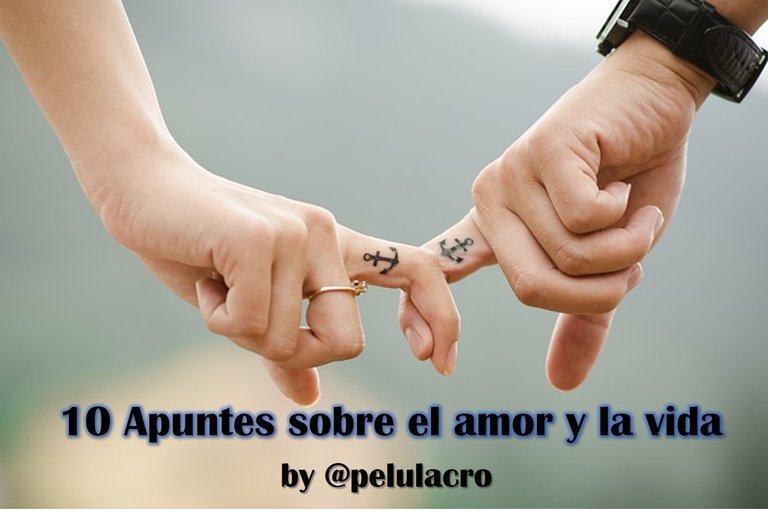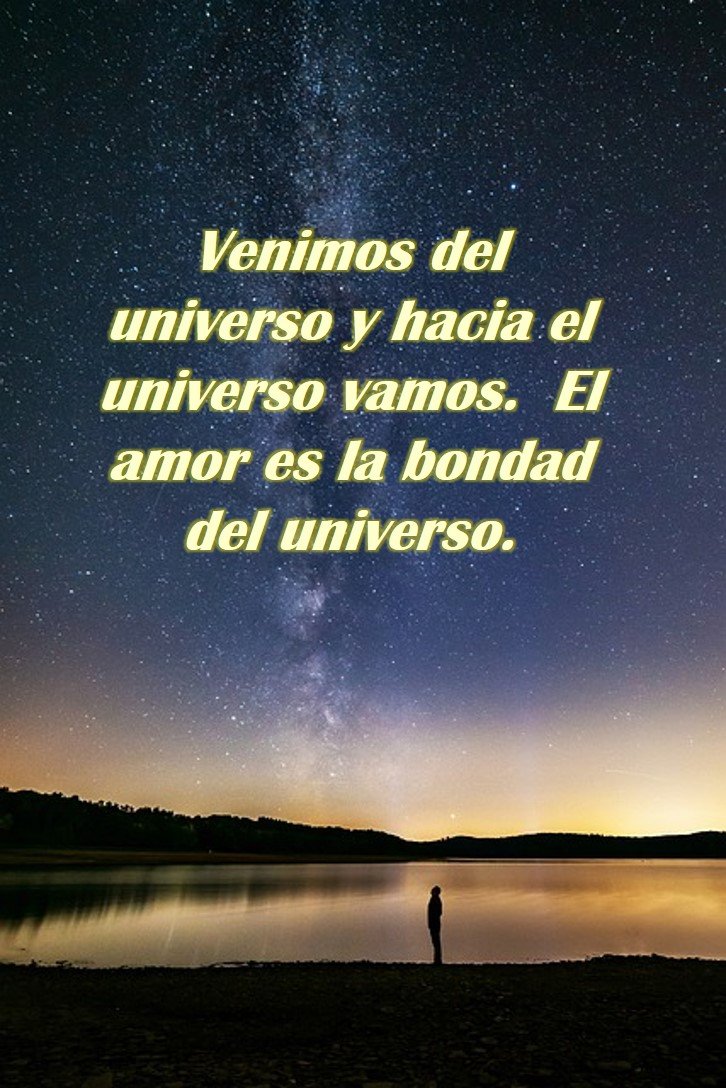
Foto de Imagen editada de Pixabay
I
Amar es liberar el alma, compartir el espíritu, los sentimientos por otros y sentir el placer de dar y recibir parecidos sentimientos de los otros. Entregar el alma y rescatarla al mismo tiempo para volver a entregarla, una vez más, con más fuerza, cada día diferente al anterior, con mayor intensidad y calor, para siempre.
II
Se vive y se muere en cada beso, en cada abrazo; se muere y renace en cada caricia, en cada mirada, en las palabras o en los silencios, en los cuerpos temblorosos y sudorosos, en cada espacio, en cada segundo de hoy. En cualquier circunstancia presente.
III
Amarse a sí mismo es amar la libertad y la verdad propia y la del otro. Amarse a sí mismo es no querer oprimir, juzgar o someter al otro. Amarse a sí mismo es no causar dolor; pero también compartir las alegrías, la tristeza y la resignación con el otro. Amarse a sí mismo es la emoción más elevada porque nos lleva a un plano superior que nos permite o conduce a los mejores propósitos para los demás y el mundo que nos rodea.
IV
Amor verdadero es pertenecer a nuestra propia palabra resumida en cada beso. Amar es querer con nuestro amor, no con el del otro. Amor sin condiciones. Se trata de una unión para desatar, para ofrecer nuestra libertad de amar, liberándonos. Acompañar y sentirse acompañado. Amar y sentirse amado. Amar a los otros es una forma de mejorar nuestro entorno.
V
La felicidad solo es posible hoy, en la vida y el amor del presente, la palabra mágica del amor de hoy. El futuro es un mito de la política y la religión. El pasado es para los historiadores y sus anacronismos. El amor siempre es posible hoy en ti, en mí, en nosotros y en la poesía de la vida. Amar en el presente es el paso necesario para la verdadera trascendencia, para la vida eterna
VI
El verdadero amor es imperfecto; pero perfectible en el tiempo. Se puede tener momentos felices perfectos, pero nunca la sensación perfecta de la felicidad; porque no existe en la realidad, sino en la imaginación, en los ideales. No existe la perfección; pero sí el camino de la perfección, dijo San Agustín. Entiendo que el camino es buscar (viviendo-haciendo) en el presente; es decir, hacerlo realidad en el hacer de hoy. Se puede alcanzar la dicha, haciendo dichosa a la persona que amamos.
VII
Como no existe el amor perfecto; tampoco la pareja perfecta. No se puede encontrar la pareja perfecta porque no somos perfectos. La perfección se reduce a un manual de instrucciones las cuales son ideales para los procesos o el funcionamiento de las máquinas; nunca de las personas. La perfección es un programa clásico para el automatismo de las personas sometidas a normas para cumplir con una predestinación. Solo el amor de Dios y/o a Dios es perfecto; se da y se recibe en lo más íntimo de nuestro mundo interior, en nuestro espíritu, en el alma; no necesariamente en los templos; porque está en todas partes, en todas las cosas, en el universo.
VIII
La vida, como el amor, son el camino para la vida eterna. Un camino por recorrer, no para esperar. Unos caminan, otros corren en su camino, buscando. El camino es una búsqueda permanente para alcanzar los propósitos de vida, los propósitos de amor; esa es nuestra pasión. En ese camino están el principio y el fin; y en ambos el amor que es parte esencial del alma.
IX
El amor a Dios y el de Dios es el sentimiento más elevado; por su perfección, por su proyección en todos los órdenes de la vida. Venimos del universo y hacia el universo vamos. El amor es la bondad del universo. El amor es una fuerza sublime que alienta el espíritu y los propósitos del Bien común.
X
El amor nos lleva a vivir en el verdadero gozo y el placer de la vida, en cualquier momento y en cualquier lugar. La creencia de la vida eterna proviene del amor de Dios y es la que nos anima de manera permanentemente a vivir una vida plena, elevada en el ideal superior del Bien; libre de las tentaciones y acciones de los niveles inferiores que nos apartan de nuestros propósitos de alcanzar la felicidad. San Agustín escribió: “Ama y haz lo que quieras”; en mi opinión se refiere al Amor a Dios, como fuente inagotable y placentera para el logro de los propósitos de vida plena, en libertad.


I
To love is to free the soul, to share the spirit, the feelings for others and to feel the pleasure of giving and receiving similar feelings from others. To deliver the soul and to rescue it at the same time to deliver it again, once more, with more strength, each day different from the previous one, with more intensity and warmth, forever.
II
One lives and dies in every kiss, in every embrace; one dies and is reborn in every caress, in every glance, in the words or in the silences, in the trembling and sweating bodies, in every space, in every second of today. In any present circumstance.
III
To love oneself is to love one's own freedom and truth and that of the other. To love oneself is not to want to oppress, judge or subjugate the other. To love oneself is not to cause pain; but also to share joys, sadness and resignation with the other. To love oneself is the highest emotion because it takes us to a higher plane that allows or leads us to the best purposes for others and the world around us.
IV
True love is to belong to our own word summed up in every kiss. To love is to love with our love, not with that of the other. Love without conditions. A union To accompany and to feel accompanied. To love and to feel loved. Loving others is a way to improve our environment.
V
Happiness is only possible today, in the life and love of the present, the magic word of today's love. The future is a myth of politics and religion. The past is for historians and their anachronisms. Love is always possible today in you, in me, in us and in the poetry of life. To love in the present is the necessary step for true transcendence, for eternal life.
VI
True love is imperfect; but perfectible in time. One can have perfect happy moments, but never the perfect sensation of happiness; because it does not exist in reality, but in the imagination, in ideals. There is no such thing as perfection; but there is the way to perfection, said St. Augustine. I understand that the way is to seek (living-doing) in the present; that is, to make it a reality in the doing of today. We can achieve happiness by making the person we love happy.
VII
Just as there is no such thing as perfect love, there is no such thing as a perfect partner. The perfect partner cannot be found because we are not perfect. Perfection is reduced to an instruction manual which is ideal for the processes or the functioning of machines; never of people. Perfection is a classic program for the automatism of people submitted to rules to fulfill a predestination. Only the love of God and/or to God is perfect; it is given and received in the most intimate of our inner world, in our spirit, in the soul; not necessarily in the temples; because it is everywhere, in all things, in the universe.
VIII
Life, like love, is the road to eternal life. A road to travel, not to wait. Some walk, others run on their way, searching. The road is a permanent search to reach the purposes of life, the purposes of love; that is our passion. On that road are the beginning and the end; and in both the love that is an essential part of the soul.
IX
The love of God and the love of God is the highest feeling; for its perfection, for its projection in all orders of life. We come from the universe and toward the universe we go. Love is the goodness of the universe. Love is a sublime force that encourages the spirit and the purposes of the common Good.
X
Love leads us to live in the true joy and pleasure of life, at any time and in any place. The belief in eternal life comes from the love of God and is what permanently encourages us to live a full life, elevated in the higher ideal of the Good; free from the temptations and actions of the lower levels that divert us from our purposes of attaining happiness. St. Augustine wrote: "Love and do what you will"; in my opinion it refers to the Love of God, as an inexhaustible and pleasurable source for the achievement of the purposes of full life, in freedom.

Foto de Imagen editada de Pixabay

- Separadores elaborados en Canva
- 100% contenido original
- Traducción realizada con DeepL

Que hermoso estos apuntes sobre el amor, que deberían ser mandamientos. San Agustín tiene frases muy hermosas, me gustó mucho la que usaste y mi favorita es "la medida del amor es amar sin medidas".
Gracias por compartirnos estos apuntes sobre el amor : )
Con gusto @miriannalis ; saludos y felicitaciones por la excelente labor que llevas en c/Holps&Lotus
Profunda reflexion en palabras llanas, pero poderosas. Bien hecho @pelulacro.
Gracias @zeleiracordero-2 por leerme y comentar; este es un tema interesante que se puede tratar con un discurso llano porque la idea es llegar a todos; a veces no conviene incurrir en la tentación del discurso barroco o profusamente condimentado con argumentaciones profundas que alejen al lector de la lectura hasta el final del texto. Saludos
Esta publicación ha recibido el voto de Literatos, la comunidad de literatura en español en Hive y ha sido compartido en el blog de nuestra cuenta.
¿Quieres contribuir a engrandecer este proyecto? ¡Haz clic aquí y entérate cómo!
Gracias por el voto @es-literatos y por compartir mi publicación
@tipu curate 8
Upvoted 👌 (Mana: 0/75) Liquid rewards.
Gracias bella @cieliss @tipu por leerme y apoyarme con tu voto
Congratulations @pelulacro! You have completed the following achievement on the Hive blockchain And have been rewarded with New badge(s)
Your next target is to reach 17000 upvotes.
You can view your badges on your board and compare yourself to others in the Ranking
If you no longer want to receive notifications, reply to this comment with the word
STOPCheck out our last posts: